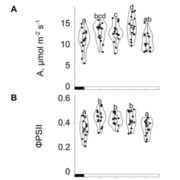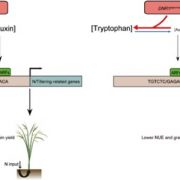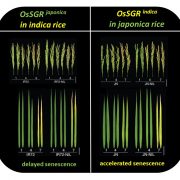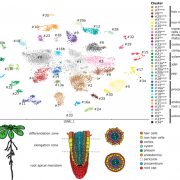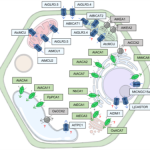Review: Chronoculture: improving crop yield and sustainability by exploiting the plant circadian cycle ($) (Science)
 The circadian cycle affects almost all eukaryotic cells. In the case of plants, circadian rhythms affect many processes including the supply of carbon during the night for respiration and growth, and many other agricultural traits. The use of this knowledge for adapting agronomic practices or to alter circadian rhythms in crops through breeding and gene editing has been described as “chronoculture,” just as considering the impact of time of day on human biology is called “chronomedicine”. Early farmers and breeders looking for higher yields indirectly selected loci related to the circadian cycle, many of which are associated with the regulation of flowering; optimized time of flowering can optimize yields avoiding abiotic stresses later in the season. Similarly, tweaking the time of day at which stomata are open can improve water efficiency. Plant defenses can be tuned to the times of day at which their pathogens and pest are most dangerous. Fertilizer and pesticides have been also found to be more efficient when applied at specific times of the day. The rich knowledge of the molecular control of plant circadian clocks and responses provide ample opportunities to improve crop yields through chronoculture. (Summary by Cecelia Vasquez-Robinet) Science 10.1126/science.abc9141
The circadian cycle affects almost all eukaryotic cells. In the case of plants, circadian rhythms affect many processes including the supply of carbon during the night for respiration and growth, and many other agricultural traits. The use of this knowledge for adapting agronomic practices or to alter circadian rhythms in crops through breeding and gene editing has been described as “chronoculture,” just as considering the impact of time of day on human biology is called “chronomedicine”. Early farmers and breeders looking for higher yields indirectly selected loci related to the circadian cycle, many of which are associated with the regulation of flowering; optimized time of flowering can optimize yields avoiding abiotic stresses later in the season. Similarly, tweaking the time of day at which stomata are open can improve water efficiency. Plant defenses can be tuned to the times of day at which their pathogens and pest are most dangerous. Fertilizer and pesticides have been also found to be more efficient when applied at specific times of the day. The rich knowledge of the molecular control of plant circadian clocks and responses provide ample opportunities to improve crop yields through chronoculture. (Summary by Cecelia Vasquez-Robinet) Science 10.1126/science.abc9141


